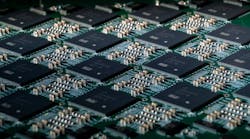Intel warned personal-computer makers that its shortage of chips will continue for the foreseeable future despite record spending over the last year to ease its production problems. Intel, which holds about 80% of the market for PC chips, apologized to customers Wednesday for struggling to end the shortage, which has slowed growth in the PC market.
Michelle Holthaus, Intel's general manager of sales, marketing and communications, said the shortage could result in shipment delays. She said stronger-than-anticipated demand for PCs continues to outpace the supply of Intel Core CPUs. The shortages are so severe that the world's largest supplier of computer chips has started to outsource more of its total production to other chip makers.
"Sustained market growth in 2019 has outpaced our efforts," Holthaus said in a letter published Wednesday. "Supply remains extremely tight in our PC business where we are operating with limited inventory buffers. This makes us less able to absorb the impact of any production variability, which we have experienced in the quarter. This has resulted in the shipment delays you are experiencing."
"Despite our best efforts, we have not yet resolved this challenge," she cautioned.
The Santa Clara, California-based company has been fighting the shortfall since early 2018. Robert Swan, Intel's chief executive, confessed to facing worsening shortages of chips based on 14-nanometers last year, blaming unforeseen demand for PCs. For the last year, Intel has focused production on more profitable chips with high core counts used in data centers and high-end personal computers.
Swan said last month that the shortage will last longer than anticipated. He said capacity challenges will continue in the fourth quarter of 2019 and potentially into 2020, despite increased investments in its production. "As we see the fourth quarter, we're still going to constrain our customers' growth, which is absolutely where we do not want to be," Swan said on an earnings call last month.
Intel has been pushing to ease the pressure on its manufacturing plants around the world. The Silicon Valley giant bumped capital spending last year by 30% to $15.2 billion to help solve the production bottleneck. The company last month raised its forecast for 2019 capital spending from $15.5 billion to $16 billion as part of increased investment in its latest chip production process, 10-nanometers.
Intel bolstered its production of chips based on 14-nanometers by 25% over the last year, delivering a double-digit bump in its supply of core processors from the first half to the second half of 2019. The company also plans to supplement its supply of chips based on 14-nanometers and 10-nanometers by 25% in 2020. Intel expects "mid-to-high single-digit" growth in global PC shipments in 2020.
But the company has struggled to end the shortage, which has also dampened demand for memory chips and other components used in PCs. Intel said it has started to contract out more of its manufacturing to increase its inventory of Core CPUs. "We are increasing our use of foundries to enable Intel’s differentiated manufacturing to produce more Intel CPU products," Holthaus told customers.
"We are focused on getting capacity in place so we can take the word shortage out of our quarterly discussions," George Davis, Intel's chief financial officer, said last month on a conference call with analysts. The shortage has diminished Intel's market share in lower-cost PCs, where AMD is gaining ground. The shortage opens up the possibility of Intel losing more market share in 2020, analysts say.
"We're continuing to build capacity in 2020 because we think it gives us an opportunity to compete for those units next year," Davis said.
Intel's personal computer business slumped slightly to $9.7 billion last quarter as it struggled to meet continuing growth in demand. More than 68 million personal computers shipped globally over the last quarter, increasing more than 1% from a year ago, according to Mikako Kitagawa, senior research analyst at Gartner. Davis said it is looking to resolve its supply problems before the end of 2020.
Intel is also facing stiff competition. AMD is set to snatch market share by introducing new Ryzen CPUs based on the world's most advanced production process, called 7-nanometers, which offers faster performance and lower power consumption. Qualcomm, the world's largest vendor of smartphone chips, has also started selling chips that enable longer battery life for laptops, tablets and other PCs.
Delays in the development of its 10-nanometer production process have loomed over Intel for years. Intel has surrendered the crown in advanced chip technology to TSMC, which serves customers ranging from Apple and Google to AMD and Nvidia. Intel said its latest 10-nanometer CPUs would start selling in PCs before the end of 2019. It also plans to roll out chips based on 7-nanometers in 2021.
"We're investing to recapture process leadership going forward," Intel's Swan said on the conference call with Wall Street analysts last month. "We are going to be very open minded about, 'How do we make sure we're building the best products?' and where we build them is something we will always evaluate." He confessed that "we're letting our customers down and they're expecting more from us."

